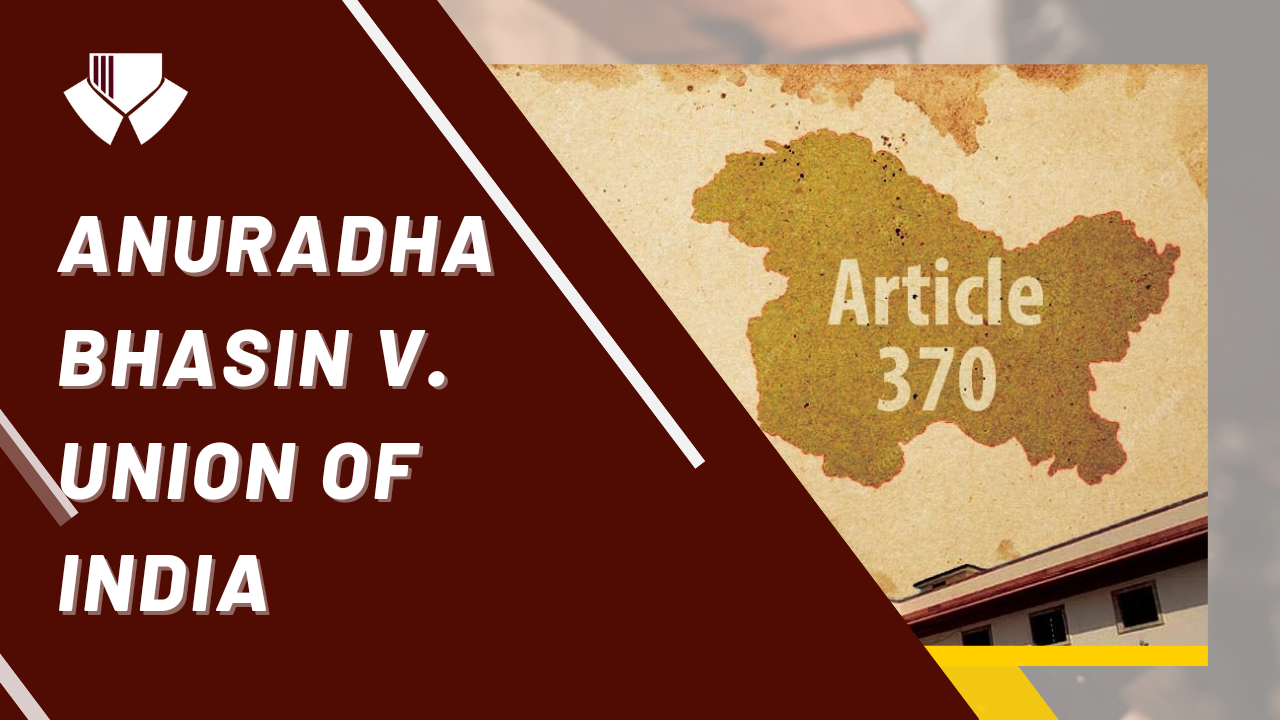This Case Analysis is written by Sumita Patra, a law student of Amity university Mumbai.
CASE NO – Writ petition(civil) No. 1031 of 2019
CASE TYPE- Writ petition
PETITIONER – Anuradha Bhasin and Ors.
RESPONDENT – Union of India and Ors.
BACKGROUND:
• Under article 370 Jammu and Kashmir enjoyed special status that has been a subject of decade of a long dispute between India and Pakistan.
• On 5th august 2019 when an order was given by president of India , which stripped Jammu and Kashmir on its special status . the order says that all the provision of the constitution will now applicable on Jammu and Kashmir.
•When the constitutional order was imposed,from that day Indian government started restricting on online communication and freedom of movement. Schools and offices were ordered to close until further notice and subsequently mobile phone networks, internet services and landline connectivity were shut down in that region.
•Later on district magistrate imposed restriction on freedom of movement and public assembly under article 144 of Code of Criminal Procedure. This was challenged in a court for violation of article 19 by Ms Anuradha Bhasin, who was the executive editor of the kashmir times (Srinagar edition) . a Writ petition was also filled by her under article 32. She told that internet connectivity is necessary for the modern media. From 6th august, 2019 she was unable to publish her news ,then the authority forced the print media to come to a’ griding halt’.
ISSUES INVOLVED:
- Whether the imposing restriction on freedom of movement and public assembly under article 144 are valid?
- Whether the freedom of speech and expression and freedom to practice any profession ,or to carry any occupation ,trade or business over the internet is part of the fundamental rights protected under article 19(1)(a) and article 19(1)(g) of the constitution?
- Whether the government action on prohibited internet access in that region is valid?
CONTENTIONS OF PETITIONER AND RESPONDENT
• PETITIONER
The petition was filed my ms Anuradha bhasin , the executive editor of the Kashmir edition. She argued that government failed to give proper reason for pass the order and suspense the rule.
Intervener argued that there should be necessary measures to maintain national security which was not there.
He submitted that fundamental rights which is protected under article 19, were violated for the action ,which was taken by government.
Article talks about ‘all citizens shall have the right’
- To freedom of speech and expression;
- To assemble peaceably and without arms.’
•RESPONDENT
Mr. K.K. Venugopal, learned Attorney general for union of India submitted that necessary measures has been taken into account against the jammu and kashmir because there was conflict regarding the same. If government does not take any action then there can be huge violence.
Solicitor general Tushar Mehta stated that it is the duty of the state to protect the citizen from any kind of violence and the Government took necessary step to avoid those situation.
The order passed under article 144 of crpc is valid in order to the safety of citizens.
JUDGEMENT-
The Supreme court held that the government cannot contend any kind of exception for providing any order which is passed under article 144 of CrPC.
The court also stated that internet connectivity is very necessary in today’s life so, nobody can stop from using internet. Court further stated that freedom of speech and expression and freedom to practice any profession, occupation or trade on the internet is a part of fundamental right in the constitution.
The judgement did not provide immediate relief to the citizens but it laid down for future.
CONCLUSION:
The judgement was passed for the betterment of society for future consideration, but it does not give immediate relief to the people in Jammu and Kashmir . Their right was violated under article 19 by the government action. The court has allowed to impose complete prohibition on freedom of speech and expression which can be misused by the government to suppress any voice which reasonably questions the actions of the government. in this case the plaintiff filed writ petition under article 32 for violation of fundamental right. Therefore it can be said that , the doctrines held in this case will age well and can be used more judiciously .


